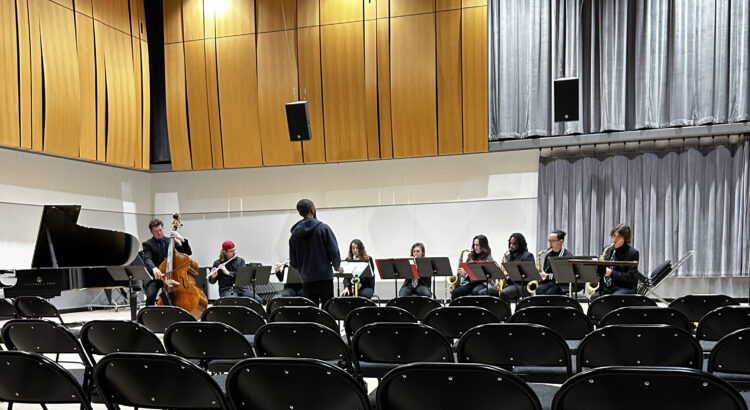Creative Arts Orchestra is an experimental modern music group at the University of Michigan’s School of Music, Theater, and Dance, directed by Marcus Elliot. It’s specific to the jazz department, but there are a range of participating players among the music school’s student body. This is one of the most unique ensembles at the University, emphasizing improvisation and feel over Western structure and harmony of music. They often invite interaction with other performance fields such as dance, theatre, and music technology.
The ensemble features 9 students, with a few of the players doubling on 2 or 3 instruments. The orchestra includes double bass, flute, clarinet, tenor sax, baritone sax, alto sax, and trumpet. At least 3-4 saxes were playing at a time due to the instrumentation, so the sound came off particularly bright. The double bass carried the darker, grounding sound in the music and was necessary texture-wise. The group has a truly unique way of blending, demonstrating the high level of musicianship present.
As for the performance, the music sounded atonal and arhythmic. There wasn’t a specifically defined structure of what notes to play, but each piece was still quite different. Marcus Elliot, the conductor, chose certain moments to cue everyone in for a tutti line or harmony, but he was not overly controlling of the ensemble. I did not get to see what the player’s scores looked like but I assume they are somewhat free with little actual notation based on how the music sounded.
I noticed if I tuned out of the moment, this ensemble sounded like noise. It reminded me how humans cling to structure in every aspect of life, including something as ambiguous as music. We anticipate “A” sections and a bridge that leads us back into a repeated “A” section, along with harmonies that are comfortable to our ears. This ensemble takes a hard right turn on that construct and plays into the emotion of a moment while creating an atmosphere for the listener with the various timbres of instruments. I respected the hyper-focused nature of the ensemble regarding this. They prioritized settling into the moment of the music and the group’s sound.
The set featured compositions by members of the ensemble including Noah Pujol, MM Clarinet 23’, Houston Patton BFA, Jazz 23’, and Marlena Boedigheimer, MM Jazz 24’. Often their selections started with a theme and transitioned seamlessly into group improvisation. It felt like a portrait of a moment and the instrumentation that was present within the sound.
Half-way through the concert, they featured Canadian pianist, Kris Davis. She is a Vancouver-born jazz-pianist and composer with a variety of discography available. I appreciated how much the sound was expanded once a pianist entered into the space. I enjoyed the complexity added to the music by Davis. There are more options with the instrument which allows for lower notes to be added into the music.
There’s a certain meditativeness to the music, and a smaller audience reinforces the intimate experience of the concert. This ensemble is something to be perceived in real time, to properly absorb the spur-of-the-moment cultivation of the atmosphere. Most of all, this was an experience of collective sound along with talented musicians presently existing alongside one another. If you are interested in experiencing this, the next Creative Arts Orchestra will be on March 14th, at 8 pm in Hankinson Rehearsal Hall in the Moore building on North Campus. They will be playing with SMTD alum Mat Endahl!
Image by Caitlyn Bogart.



